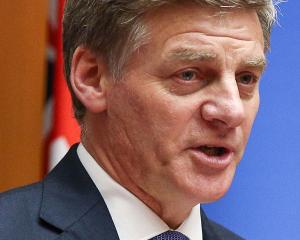Bill English's third Budget will be tough, perhaps the toughest in a generation. But this next Thursday's document won't be as tough as people fear. Or as tough as people have been led to believe.
National has indulged in a classic pre-Budget softening-up exercise - just as John Key and Bill English did last year by adjusting the electorate to a rise in GST.
By Budget day, GST was old news. The focus then went on how juicy were the accompanying cuts in income tax.
Using the same "bad news" then "good news" strategy this week, the Prime Minister foreshadowed changes to KiwiSaver, notably an as-yet unspecified cut in the Government's annual contribution of up to $1040 to individual accounts.
The advance warning was accompanied by confirmation of the expected phasing out of Working for Family income support for the well-off, along with stricter criteria to stop people avoiding repaying their student loans.
Unlike Budgets in the past, none of those curbs will be rushed through Parliament on Budget day. The changes will instead be implemented in a far more pedestrian fashion, a stipulation being that National secures a mandate in the November election.
Mr Key is increasingly insisting on such "transparency" regarding his Government's intentions. He sees building the public's trust in National as one of his essential tasks.
That is one reason why despite a record deficit, this Thursday will not be even a modest reprise of Ruth Richardson's likewise recession-driven 1991 "Mother of All Budgets".
Mr Key's antipathy to such "slash-and-burn" exercises reflects his ideological leaning as a centre-right moderate, despite Labour's efforts to paint him in more extreme garb. While it is not obvious, Mr Key also moves with caution. If reforms are to endure, then the Government has to carry the public with it.
Just as pertinently, if a government is going to survive under MMP, it has to carry voters with it.
That alone rules out "big bang" Budgets like Ms Richardson's 1991 extravaganza. Such was the unpopularity of that document's radical shift from universal state provision to user-pays and means-testing, support for National plummeted like a stone.
However, those were the days of first-past-the-post politics. National still squeezed back into power two years later after securing just 35% of the vote. Under MMP, such an outcome would result in Mr Key being dumped from office.
These factors explain why Mr Key will have no truck with any sudden slashing of Government spending from the current level of around 35% of gross domestic product to 29% - the recommendation of Don Brash's 2025 Task Force.
An immediate overall cut of that size would have a huge effect on the provision of public services.
Even so, National is going to have to bite the fiscal bullet. This might not be the Mother of All Budgets, but Mr English is now the not-so-proud father of the "mother of all Budget deficits". This year's is a record in nominal terms at $16 billion. As a percentage of GDP, it is of worryingly Muldoonist proportions.
Though the Christchurch earthquake has been a major component, the scale of the deficit is evidence National did in fact run an expansionary fiscal policy to try to limit the effect on jobs and services of the economic downturn.
But it can no longer afford to do so to that extent.
National's focus-group research is telling the party that mainstream public opinion is shifting from wanting protection from the global financial crisis to deep concern the country is now borrowing $380 million a week just to insulate people from the downturn.
Coinciding with that is Dr Brash's political reincarnation as Act New Zealand leader. His frequent mention of that figure has him tapping straight into public angst about New Zealanders living beyond their means.
And lurking in the background are the dreaded international credit rating agencies, poised to give the thumbs down to any government cutting too much economic slack.
The upshot is that cutting through this morass and setting out a credible path for a return to surpluses became the absolute priority in the writing of this year's Budget.
Mr English and Mr Key this week both highlighted the Treasury's forecasts in the 2008 pre-election update of a deficit of $2.4 billion this year, not the actual figure of close to $16 billion. They did so to illustrate the gap they have to close. But in doing so, they also underlined the fragility of economic forecasts on revenue projections.
The kind of reception the Budget gets might well hinge on outside analysts and economists agreeing the forecasts are robust and therefore make a relatively quick return to surplus feasible.
The plus is that the shift in public opinion means there is now much greater public acceptance that getting the books in order entails sacrifice.
Witness KiwiSaver. Close to $900 million is budgeted for provision of tax credits to a large proportion of the 1.7 million members.
That pot of cash proved irresistible to the Beehive razor gangs. But the probable slicing in half of that $900 million subsidy has prompted little complaint.
Even so, National is bracing itself for a fair bit of squealing next Thursday once the various lobbies have done the numbers in what the Beehive prefers to call a "tight" rather than a tough document.
National can live with that if the great bulk of mainstream voters see National moderately positioned between the fiscal stringency of Act and what National will relentlessly argue is the profligacy of Labour and the rest of the centre-left.
• John Armstrong is the political correspondent for The New Zealand Herald.




